
Kitchen Table MFA: An Interview With World Above
Words By Emari DiGiorgio, interviewed by Nancy Reddy
This interview is part of the Kitchen Table MFA, a series that showcases writing communities through interviews and creative writing.
After the interview, be sure to check out the work of World Above members, Kit L. Lok and Cole Eubanks. Also, read Nancy’s essay on the Kitchen Table MFA series here.
Photos are from an event called “Driving While Black.”
The South Jersey Poets Collective is the nexus of a whole host of creative writing programs: World Above, a poetry reading series in Atlantic City; A Tour of Poetry for Seniors, a monthly poetry workshop sponsored by Stockton University’s Stockton Center on Successful Aging and led by a rotating group of regional poets; and poetry workshops held at community centers and facilitated by students in Emari DiGiorgio’s Why Poetry Matters course. South Jersey poets programming reaches an incredibly wide range of people across Atlantic County, from the retirees who attend the Tour of Poetry poetry workshop at the Otto Bruyns Public Library of Northfield, to senior citizens, teens, and children who participate in the Why Poetry Matters poetry workshops. World Above is regularly home to a packed house of poets from all backgrounds: retired community college professors, high school teachers, computer programmers, professional gamblers, community gardeners, social workers, baristas, stay-at-home parents, and students.
On a personal note, I’d add that World Above is really special to me: it’s the first place I read when I’d just moved to New Jersey and was feeling a bit adrift and in search of community, and I’ve returned many times to hear featured readers including Cynthia Arrieu-King, Nomi Stone, Claudia Cortese, to read in the open mic, and just to be among writers. There are two things about World Above’s format that I think are a bit unusual: each night includes an open mic and a featured reader, and the open mic is first, which feels to me like a way of saying that the open mic readers are real poets, too, not just an afterthought after the feature. There’s also always a writing prompt, mostly written by the amazing Barbara Daniels, and poets often return to a later poetry night to share the poem the prompt inspired. I love those prompts, because it feels like another acknowledgment that the people in the audience aren’t just listeners, but are writers, too. (The first four years of Barb’s prompts are available on the South Jersey Poets Website, here.)
Our interview is with Emari DiGiorgio, a poet and professor at Stockton University. She’s the author of Girl Torpedo (Agape Editions, 2018), the winner of the 2017 Numinous Orison, Luminous Origin Literary Award, and The Things a Body Might Become (Five Oaks Press, 2017). She’s the recipient of the Auburn Witness Poetry Prize, the Ellen La Forge Memorial Poetry Prize, the Elinor Benedict Poetry Prize, the New Jersey Poetry Prize, RHINO’s Founder’s Prize, the Woodrow Hall Top Shelf Award, and a poetry fellowship from the New Jersey State Council on the Arts. She’s received residencies from the Vermont Studio Center, Sundress Academy of the Arts, and Rivendell Writers’ Colony.
Nancy Reddy (NR)
The South Jersey Poets Collective includes so many different programs – the reading series, the poetry workshops, as I mentioned in the overview, and even more I didn’t know, like the Poets on a Jitney and the Bard on the Boardwalk projects that have been part of Atlantic City’s 48 Blocks celebration. How have all of these programs come together? To what extent did you build intentionally, and what parts of it were just serendipity and opportunity?
Emari DiGiorgio (ED)
As poets and writers, we often talk about observation, about tuning in to the world around us. I think that organizing community writing projects requires the same type of attention and listening. In this way, most of these projects grew out of serendipity. Take World Above, as an example: there was a core group of community writers who wanted to meet and share poetry, and they moved from library to library to a beach playground (behind a third library). These people did not have a long-standing relationship with each other; they were bound by poetry, and they were actively pursuing an opportunity to be in the company of other writers. Acting on the observation is intentional, but it was serendipity that we found ourselves meeting in Stockton’s Dante Hall Theatre.
A lot of the other smaller projects grew out a desire to create more opportunities for community poetry. For the first two years of AC’s 48 Blocks Celebration, members of the SJ Poets Collective toured AC on a Jitney, offering pop-up poetry readings at storefronts, restaurants, along the boardwalk, and at a senior highrise facility. The Collective brought poetry directly to the people, and at numerous sites, members of the community wanted to share their own original work. This past year, the SJ Poets Collective hosted Bard on the Boardwalk, where poets wrote poems-on-demand for passersby, and AC’s Longest Poem, where participants wrapped the outside of the Atlantic City Free Public Library in paper and wrote a collaborative poem titled, “I, Too, Sing Atlantic City.” Both of these projects were incredibly moving, as people who may not identify as poets/writers, or even as readers, wanted to engage with language and wanted to share their stories.
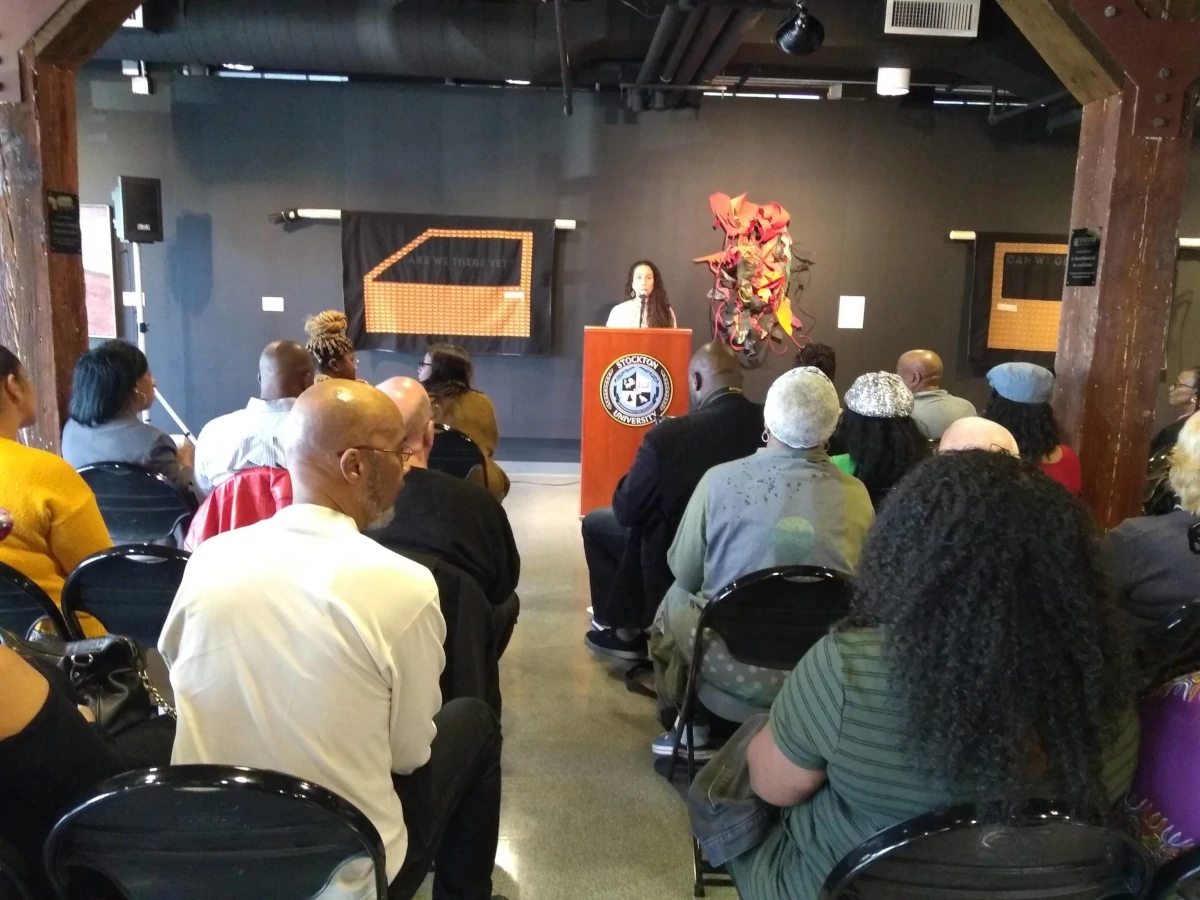
NR
Could you talk about the physical spaces in which the South Jersey Poets Collective programming happens? The geography of South Jersey can be hard – things are spread out, and there’s not a lot of public transportation. What kinds of university and community spaces does the group use, and how has that played a role in how the programming works and who’s able to access it?
ED
World Above is fortunate to use part of Stockton University’s Noyes Arts Garage, located in the heart of Atlantic City’s commercial district. The ground floor includes numerous reduced-rent studios for local artists, the African American Heritage Museum, and cafe. The University permits South Jersey Poets to use this space each month. This location is a few blocks from the Atlantic City bus and train terminals, and there is ample affordable parking in the garage and free street parking, as well. The building is also ADA accessible. World Above is the only monthly reading series in Atlantic County. As the only series of its kind, it seems essential to make it as accessible as possible–this means that everyone should be able to get there. Additionally, its proximity to the AC transportation hubs have made it easier for out-of-town visiting poets to make their way to the city, too.
In contrast, Tour of Poetry is held at the Otto Bruyns Public Library of Northfield. This facility has a large parking lot, and it is ADA accessible. There is also a bus stop close to the library, but most of the older adults who attend this monthly writing workshop choose to drive.
All of the poetry workshops offered by students enrolled in GIS 3307 Why Poetry Matters are place-based, as in the workshop is held on site. This fall, we’re offering workshops at the Chelsea Heights Atlantic City Boys and Girls Club, Covenant House, Atlantic Community Charter School, Egg Harbor Township High School, Villa Raffaella Assisted Living, and the South Jersey Veterans Center.
These projects reveal that poetry is alive and well in a variety of communities. We just create a space for it to thrive.
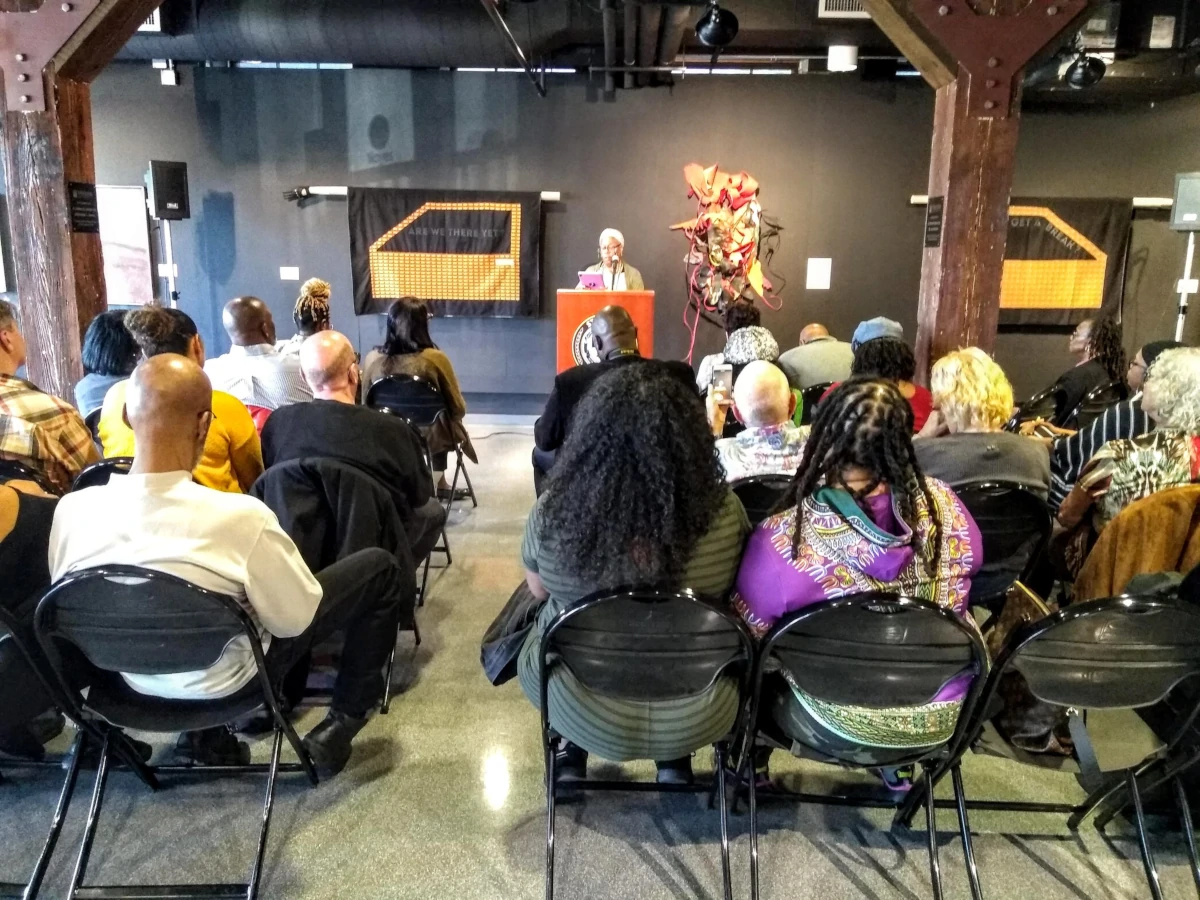
NR
One of the things I love about World Above is its diversity – not just in terms of race, but also in terms of age and class, which I think is really unusual for community writing spaces. (As you noted in your AWP In the Spotlight interview, “it’s not unlikely to have a nine-year-old and an eighty-year-old sharing their original work” – and I’ve definitely been at readings where I’ve seen that happen!) I know it’s been one of your goals to have the writers engaged with the South Jersey Poets mirror the diversity of the region as a whole. How have you made the series welcoming to so many people?
ED
It’s funny that you ask this because I am always asking, “How can I make the series welcoming to more people?” Perhaps the fact that I want to do better is part of why it is welcoming to so many.
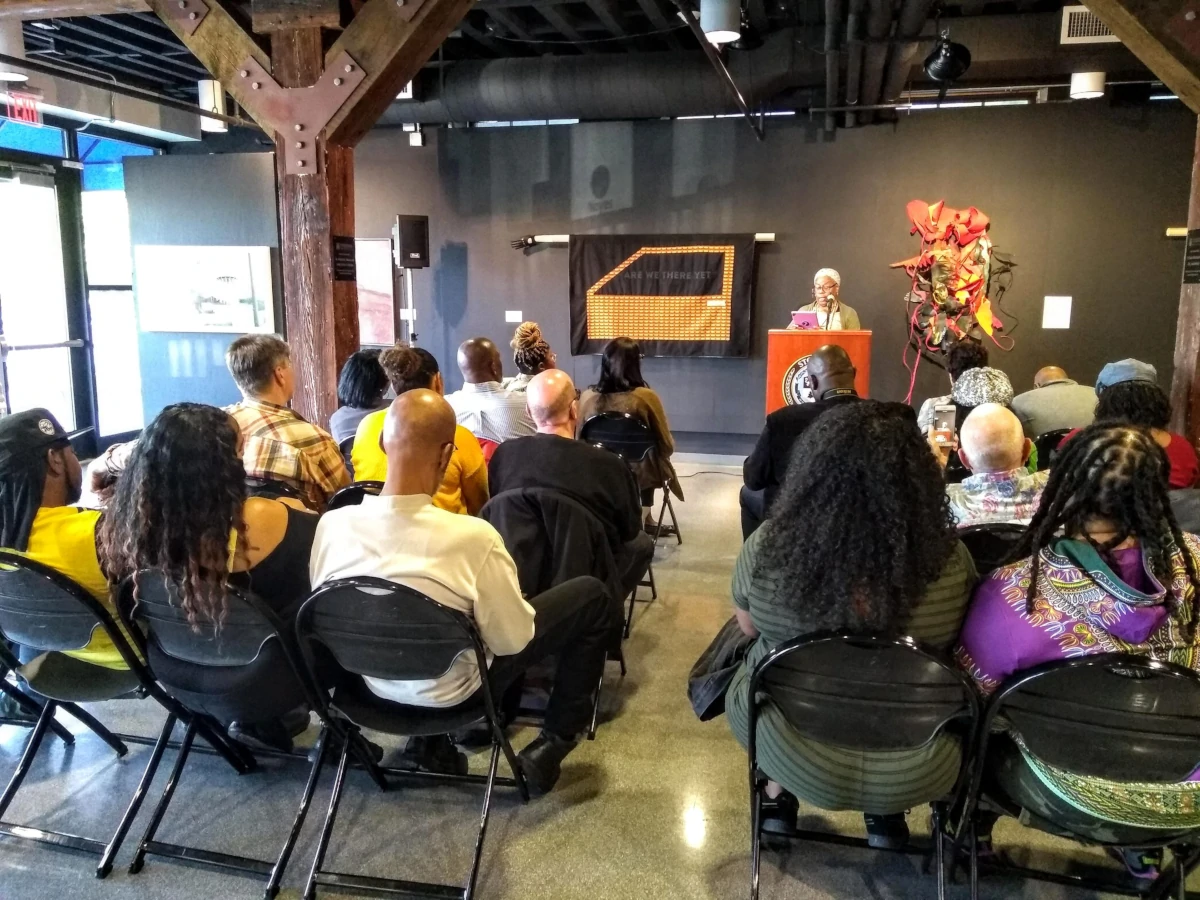
For World Above, I’ve tried to incorporate the best aspects of other series and to listen to feedback on the series. Before I took over as facilitator, the open would run for hours, and the people at the end of the list rarely had an audience remaining. People did not feel heard. But enforcing a time limit, more people could read and be heard in the open.
As the host, I try to introduce myself to all of the new faces before the event begins, and I try to make sure I have the right pronunciation of everyone’s name. These are little details, but when I am new to a space, I feel safer when I’ve been greeted and when someone attempts to learn my name.
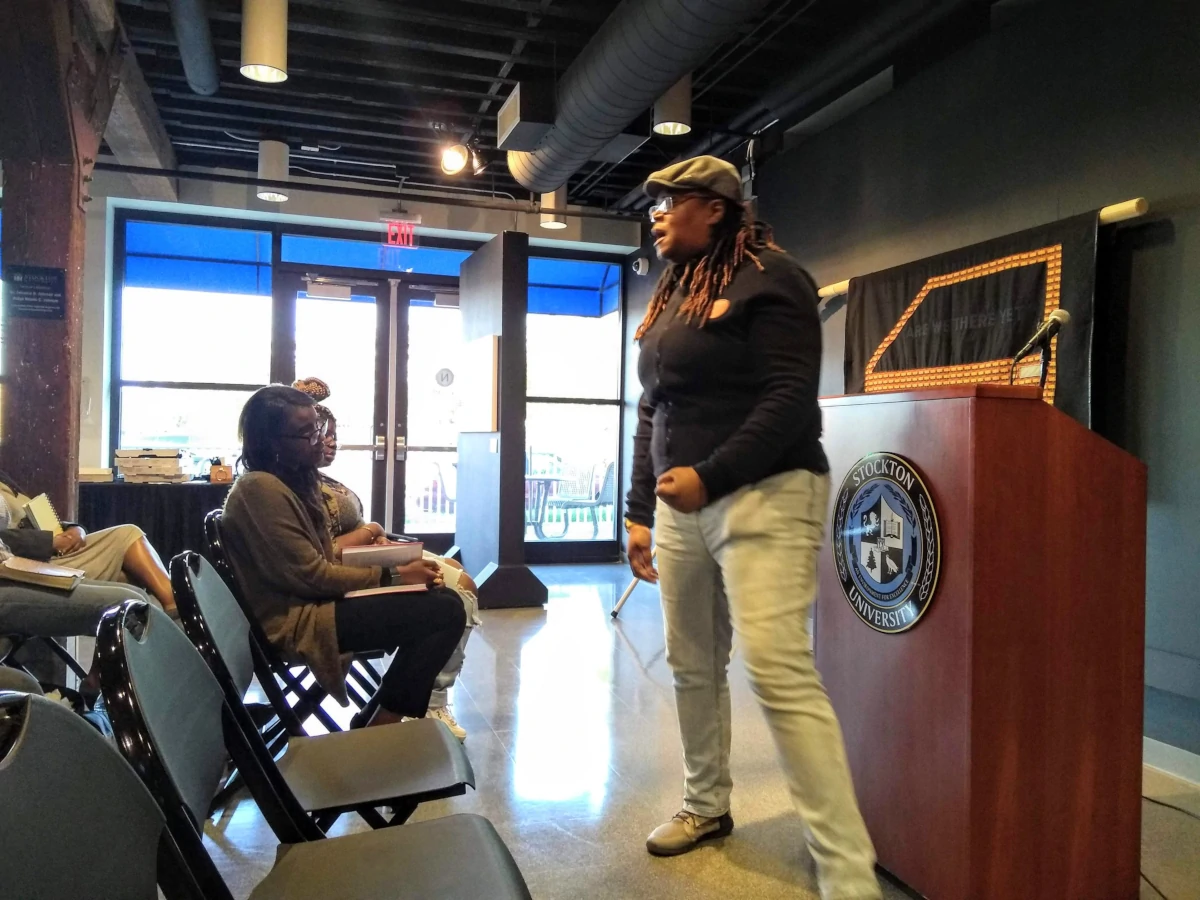
I also moved the open before the featured poet. In this way, the local poets are the opening acts to the feature. Additionally, we always have a take-home writing prompt (thank you, Barbara Daniels) after the break, which encourages everyone to stay and is a kind of poetry party favor.
In terms of the featured poets, I do try to create a diverse slate of readers. I’m interested in bringing in poets who represent various perspectives. I think it means a lot to someone to see and hear a poet who looks like you or who is writing stories that are your stories, too. This makes people feel welcome.
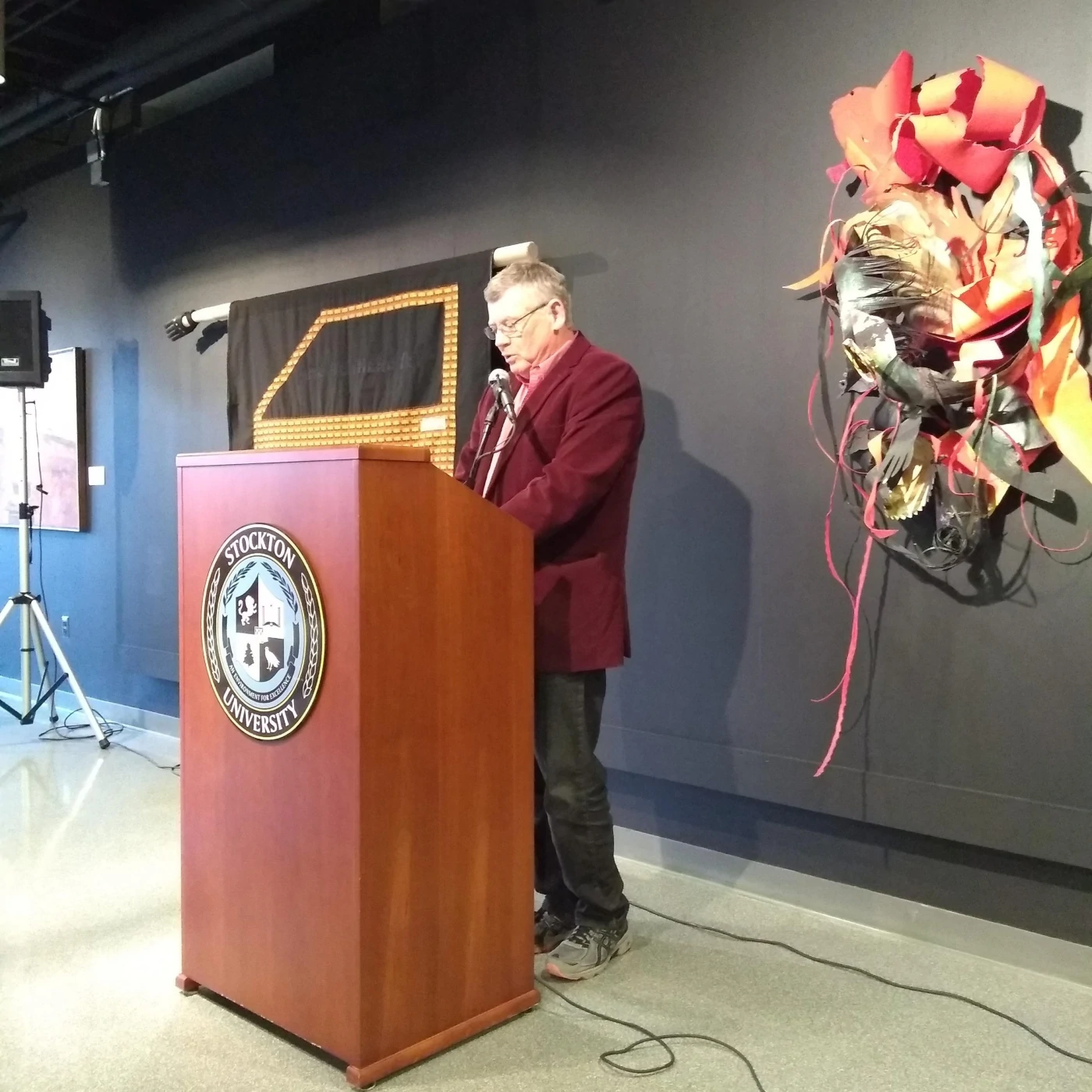
NR
In this series, we’re looking primarily at programs that are independent and not connected to any university, and South Jersey Poets is a bit of an outlier, in that it is supported by Stockton University. Could you describe the university’s relationship to the programs you run – and perhaps make some suggestions for other academics looking to create or develop programs like these about how to build institutional support for them?
ED
South Jersey Poets is fortunate to receive both in-kind and financial support from Stockton University. In-kind, we are able to use space, access the graphics department and print shop, and work with support staff to help with the logistics of payment and processing contracts.
Though we do not have a dedicated budget lines from the University, I solicit contributions from various University offices to help pay the visiting writers’ stipends. This year’s contributing offices include the School of General Studies, the School of Arts and Humanities, the Center for Community Engagement, and Stockton’s Center on Successful Aging.
When seeking to develop institutional support, it’s important to ask different departments and/or offices for financial or in-kind support. Just because your project may not align with some of the institution’s larger strategic plans, it may align with departmental goals.
That said, it’s vital to know exactly what you need–in terms of funding and space and anything else–and what you’re offering the institution in return. Stockton University values its role as a community partner and aspires to be an anchor institution in Atlantic City. The South Jersey Poets’ programs help the University work toward these goals.